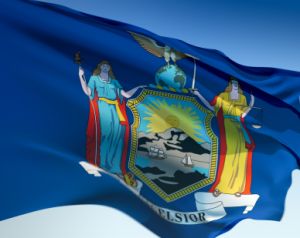 The New York State Assembly the lower house of the New York State Legislature is being presented with a bill that would change the domestic relations law so as to permit Universal Life Church ministers to solemnize weddings in New York State. The purpose of the bill is to clarify confusion over the legitimacy of marriages performed by ULC ministers and grant these ministers the same legal authority as clergy in other denominations.
The New York State Assembly the lower house of the New York State Legislature is being presented with a bill that would change the domestic relations law so as to permit Universal Life Church ministers to solemnize weddings in New York State. The purpose of the bill is to clarify confusion over the legitimacy of marriages performed by ULC ministers and grant these ministers the same legal authority as clergy in other denominations.
The bill's sponsors (the chief sponsor being Democratic State Assembly Member Sandra Galef) stated the justification for the changes in a memo, explaining that confusion has existed in the past over the legitimacy of weddings solemnized by ULC ministers in New York State. For example, while New York City grants ULC ministers clear and unequivocal legal authority to solemnize weddings, the law outside New York City is vague and open to interpretation depending on the local jurisdiction. The purpose of the bill, explain the sponsors, is to eliminate this ambiguity and clarify the terms for wedding officiation so that ministers ordained in the Universal Life Church will have the same legal authority to perform weddings as clergy belonging to other denominations.
In justifying the changes to New York's domestic relations law, the bill's sponsors also cited the legal precedence established by the laws of other U.S. states. Over half of U.S. states recognize the religious freedom of ULC ministers to solemnize weddings in their respective state weddings laws and statutes, while other states do so upon the condition that the ministers register with the appropriate state agencies. In addition, there is the fact (mentioned above) that ULC clergy have the legal right to perform the sacrament of marriage within all five boroughs of the city of New York. With respect to religious neutrality, then, if the state recognizes the Universal Life Church as a church, it must grant its ministers the same sacerdotal rights as ministers in any other church.
The changes to the domestic relations law would allow members of the ULC to join the Society for Ethical Culture in New York. The Society belongs to the Ethical Culture Movement, an ethical, cultural, and educational movement founded in 1876 by Felix Alexander and based largely on non-theistic, humanistic principles. In many ways the Society resembles churches, temples, mosques, synagogues, and other houses of worship: it is headed by leaders who function as clergy members, it holds Sunday morning meetings and educational programs for children and teenagers, and its leaders are granted the legal authority to perform weddings, baptisms, funerals, and other traditionally religious ceremonies. As members of the society, ULC ministers in New York likewise would acquire the legal right to perform these ceremonies.
Hopefully, the Assembly, which is overwhelmingly Democratic, will vote to pass the bill and grant ULC ministers equal sacerdotal rights. It is not certain, however, whether the bill applies to the original Universal Life Church in Modesto, California, or the Universal Life Church Monastery, in Seattle, which have been legally separate entities since 2006. If by chance the bill applies to the former, by inference it ought also to apply to the latter, since both are legally recognized churches in most states and fit most definitions of the word church. Indeed, it would be unfair if the bill applied to one, but not the other, given that both satisfy the same requirements for being a house of religious worship.
Many ministers in the ULC Monastery still have questions about the legitimacy of marriages that they have performed as well as the legality of online ordination. It is important to emphasize the fact that while the ULCM has met with roadblocks to legal wedding officiation in places such as Washington, DC, and some parts of Virginia, Pennsylvania, and New York, weddings performed by ULCM ministers are recognized in the overwhelming majority of U.S. states. And, of course, the church is constantly fighting on behalf of its ministers to gain legal recognition in the few remaining jurisdictions where weddings performed by its ministers are not recognized. As always, we entreat our ministers to consult their local county or parish clerk, as well as the appropriate state agency, to make certain that ULCM weddings are legally recognized in their local jurisdiction.
Do you have any questions about wedding ceremonies you have performed as a minister in the Universal Life Church Monastery? It is always better to be safe than sorry. To get more answers to your questions, join the ULC Monastery ministers' forum, our Facebook discussion forum, or our ministers' social network and share your concerns, advice, and experiences with other ministers. You can also find answers to your questions about legal wedding officiation by visiting the ULC Monastery page on U.S. and international wedding laws.
Source:


0 comments